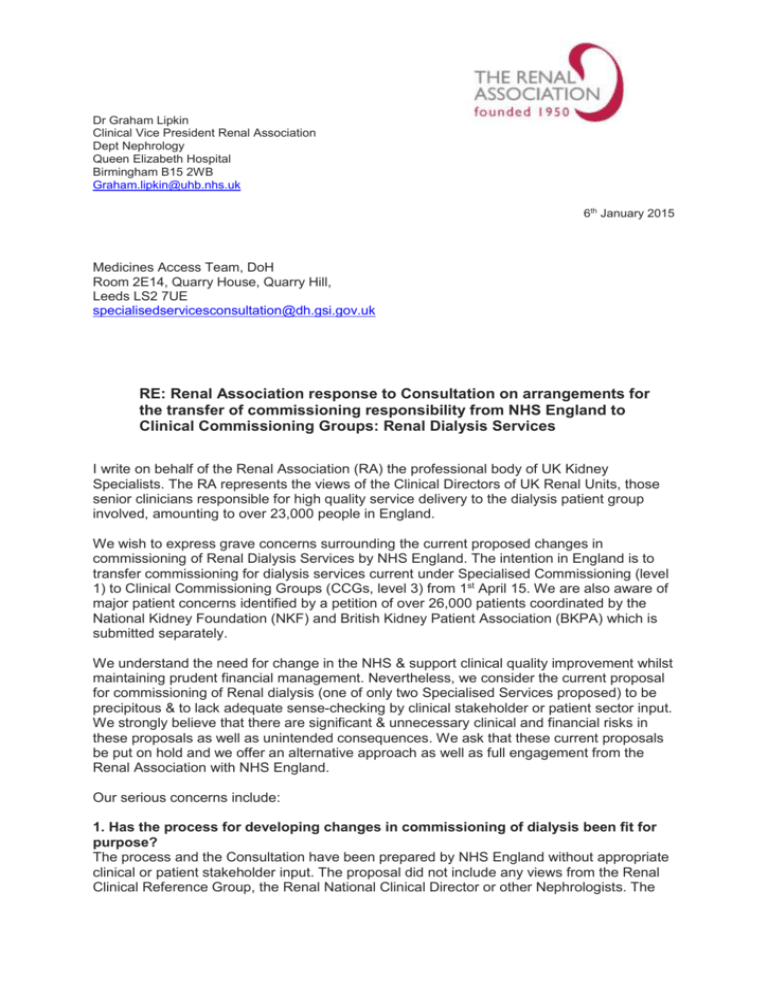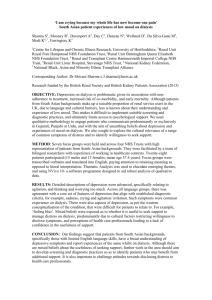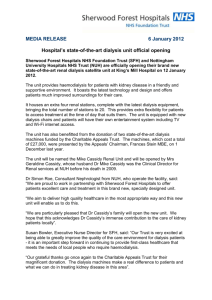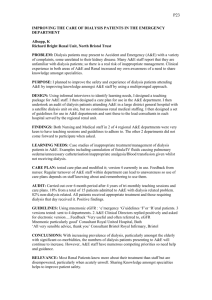A consultation on arrangements for the transfer
advertisement

Dr Graham Lipkin Clinical Vice President Renal Association Dept Nephrology Queen Elizabeth Hospital Birmingham B15 2WB Graham.lipkin@uhb.nhs.uk 6th January 2015 Medicines Access Team, DoH Room 2E14, Quarry House, Quarry Hill, Leeds LS2 7UE specialisedservicesconsultation@dh.gsi.gov.uk RE: Renal Association response to Consultation on arrangements for the transfer of commissioning responsibility from NHS England to Clinical Commissioning Groups: Renal Dialysis Services I write on behalf of the Renal Association (RA) the professional body of UK Kidney Specialists. The RA represents the views of the Clinical Directors of UK Renal Units, those senior clinicians responsible for high quality service delivery to the dialysis patient group involved, amounting to over 23,000 people in England. We wish to express grave concerns surrounding the current proposed changes in commissioning of Renal Dialysis Services by NHS England. The intention in England is to transfer commissioning for dialysis services current under Specialised Commissioning (level 1) to Clinical Commissioning Groups (CCGs, level 3) from 1st April 15. We are also aware of major patient concerns identified by a petition of over 26,000 patients coordinated by the National Kidney Foundation (NKF) and British Kidney Patient Association (BKPA) which is submitted separately. We understand the need for change in the NHS & support clinical quality improvement whilst maintaining prudent financial management. Nevertheless, we consider the current proposal for commissioning of Renal dialysis (one of only two Specialised Services proposed) to be precipitous & to lack adequate sense-checking by clinical stakeholder or patient sector input. We strongly believe that there are significant & unnecessary clinical and financial risks in these proposals as well as unintended consequences. We ask that these current proposals be put on hold and we offer an alternative approach as well as full engagement from the Renal Association with NHS England. Our serious concerns include: 1. Has the process for developing changes in commissioning of dialysis been fit for purpose? The process and the Consultation have been prepared by NHS England without appropriate clinical or patient stakeholder input. The proposal did not include any views from the Renal Clinical Reference Group, the Renal National Clinical Director or other Nephrologists. The Dr Graham Lipkin Clinical Vice President Renal Association Dept Nephrology Queen Elizabeth Hospital Birmingham B15 2WB Graham.lipkin@uhb.nhs.uk Prescribed Specialised Commissioning Advisory Group (PSSAG) which recommended the proposed change to Ministers included no kidney patient nor kidney specialist expertise. Furthermore we contest that dialysis fulfils the criteria used to select a service no longer suitable for Specialised Commissioning based on the Health and social Care Act 2012. Dialysis patient numbers included are misleading & the ‘safety criteria’ are not met. A further limitation of the process includes the questions included in the Consultation. These preclude questioning of the fundamental validity of the proposal and as such are inadequate. The evidence indicates that the process used has been hasty, the proposal has been developed without appropriate expertise or consultation & as such is not fit for purpose. 2. Is the timescale for implementation of commissioning change sufficient, optimum & safe? A final decision by Ministers on whether to approve the recommendation by PSSAG to amend commissioning is due in late January. This leaves only 2 months to define process & educate CCGs in relevant commissioning skills. There is currently little or no experience or expertise in CCGs of this patient group who negotiate a complex care pathway. Best practice in commissioning dialysis by Specialised Commissioners & their providers has been built over many years with both parties enjoying a close working relationship. Uninterrupted high quality dialysis delivery is critical to the wellbeing of this patient group. With only 2 months before going live, there are significant risks of unintended adverse clinical & health economic consequences in this current proposal. To develop and deliver a safe & effective commissioning process for this vulnerable and complex patient cohort requires learning from available expertise and surely requires more than 2 months preparation. 3. Is Commissioning dialysis at Level 3 (CCGs) optimal? Dialysis is a highly specialised treatment, involves complex patient care & pathways & is ahigh cost/treatment. Experienced National Specialised Clinical Commissioners of dialysis have undoubtedly contributed to well documented improvements year on year in clinical outcomes over the past decade (The UK Renal Registry is overseen by the RA publishes this information in the public domain). The current proposal by NHS England is for dialysis to be commissioned by CCGs. The benefits of this major change in commissioning are not identified in the proposal. It is not at all clear what the rationale is for this change since there appears to be no substantial associated likelihood of patient benefit. Each CCG may have at most a handful of dialysis patients in primary care. CCGs or even consortia of CCGs currently lack any experience of dialysis commissioning. The new proposal risks jeopardising the improvements in patient outcomes made over past years, risks unnecessary geographical variation in outcomes as well as adverse financial outcomes. The adage ‘If it isn’t broken...don’t fix it’ surely applies here. The requirement for dialysis is much greater in areas of deprivation and in the black and ethnic minority populations (more than 3 fold). Even medium sized CCG consortia may have a substantially greater need to commission dialysis than a similar sized consortium with a different demographic. The risk is that different consortia if funded on capitation, may have to make different investment decisions which could limit dialysis availability or alternatively limit other funded treatments. Dr Graham Lipkin Clinical Vice President Renal Association Dept Nephrology Queen Elizabeth Hospital Birmingham B15 2WB Graham.lipkin@uhb.nhs.uk The proposal to move dialysis commissioning to CCGs states that the overall patient pathway will be improved in that all elements of the pathway, including CKD management and dialysis management, will be under the same umbrella. It is implied that this may facilitate resource being moved to prevention of progression of CKD to prevent dialysis in the population. This argument does not stand up to scrutiny. GPs have worked very effectively with nephrologists to develop mechanisms to screen for CKD and institute measures to slow progression despite current National Commissioning arrangements. There is evidence that this may be starting to be effective. and so far this strategy has worked well. The predicted rate of rise in the dialysis population has slowed in recent years but further investment in CKD management will not reduce the increased costs associated with an increase in the dialysis population in the short term. Furthermore an equally critical pathway for patients with end stage renal failure is that of kidney transplantation, which improves quality and length of life as well as a substantial reduction in costs. This proposal will fracture the commissioning of dialysis from transplantation and risk the current growth in transplantation. GPs do currently commission dialysis transport services. Satisfaction surveys of dialysis patients recurrently identify transport as their main concern. If CCGs are unable to sort this aspect of care, one may question whether transferring more of the dialysis patient pathway to CCGs is advisable. 4. Will the proposal maintain Strategic National Oversight, availability of dialysis to those who may benefit & ensure continuing quality & patient safety improvement? It is not completely clear whether the proposal retains the Renal Clinical Reference Group (CRG), Renal National Clinical Director (NCD) & the Clinical Service Specification (CSS) for dialysis. Geographic variability in dialysis service availability & quality was considerable not so many years ago. The Renal National Service Frameworks, (subsequently NHS Kidney Care), Renal CRG and NCD plus NHS investment has led to year on year improvement in outcomes for patients treated by dialysis, carefully monitored by the UK Renal Registry (part of the Renal Association). National strategic oversight, the CSS, the NCD and the Renal CRG must not be dismantled in any proposal lest the gains of the last decade be lost resulting again in geographic inequality. Alternative arrangements: We believe that the stated potential benefits of the current proposal could be achieved by other models of commissioning & lead to better quality with less clinical risk. a. Co-Commissioning (level 2): Joint National Specialised and CCG Commissioning In this model the proposed benefits in the current proposal could be combined with the currently proven benefits of national commissioning. Existing national expertise would be retained; the CRG and Service Specification would ensure equality of access and Dr Graham Lipkin Clinical Vice President Renal Association Dept Nephrology Queen Elizabeth Hospital Birmingham B15 2WB Graham.lipkin@uhb.nhs.uk quality across the UK. Current planned developments of dialysis quality improvement & increased patient safety would continue. b. Keep the Status Quo This works, why change a working system? c. Postpone introduction of level 3 Commissioning until 2016. Delay in moving to CCG Commissioning would allow clear definition of the model well in advance of starting. Over the coming year the RA would be keen to engage with NHS England to help ensure the optimal commissioning model. This would reassure the patient and clinical communities. Existing expertise and corporate memory could be used to educate CCG consortia leading to a better overall service. If dialysis commissioning moves to CCG consortia it is essential that the consortia are of a sufficient size to be able to absorb variations in the prevalence of dialysis in their population. Ideally this could be contiguous with the Strategic Clinical Networks. This would enable a direct meaningful discussion between providers and their Commissioners so as to adapt the service to local needs, a considerable benefit. This cannot be achieved if the CCG consortia are too small. The optimum size needs to be carefully considered. A shadow arrangement over the next 12 months would help identify problems that could be addressed before going live. We ask that the current proposal or commissioning of dialysis by CCGs from April 2015 postponed at least until 2016. This will allow time for appropriate stakeholder review & optimisation. The risks of rolling out a hastily conceived commissioning plan within the next 2-3 months are substantial both in clinical and financial outcomes. The Renal Association is keen to offer engagement and support to optimise the final commissioning arrangements by working with NHS England. The Renal Association has a history of innovation in service development and is keen to adopt new arrangements where this is likely to improve patient care. Postponement of the current proposal would also enable input by other stakeholders, not least the patient sector input and the renal multi-professional team representatives. Dr Graham Lipkin Consultant Nephrologist & Clinical Vice President of the Renal Association Dr Graham Lipkin Clinical Vice President Renal Association Dept Nephrology Queen Elizabeth Hospital Birmingham B15 2WB Graham.lipkin@uhb.nhs.uk





